As an extension of the previous post I wrote about regarding feminist-friendly cartoon choices and considering that, in my experience anyway, fans of video games and Japanese anime seem to overlap, I would like to offer some suggestions for navigating the wide and extensive world of anime. Much like any other form of media, not all anime is created equal, especially in terms of its representation of women and non-heteronormative relationships (racial representation is also considered but all characters in anime unless otherwise stated are generally considered to be Japanese in the intersectional feminist community and therefore assumed to be people of color by default). In a medium in which harems, where a male character collects a group of women who all (generally inexplicably) have an attraction for him and compete for his romantic affection, objectifying “panty shots,” comedic sexual harassment, and female characters that exist only to be romance options run fairly rampant, the quest to find an anime that’s not problematic, especially through an intersectional feminist lens, can be discouraging. Nevertheless certain genres, especially magical girl and “josei” (anime geared towards adult women), are often very promising and series that portray women having power and agency, relationships between other women both in a friendship and relationship sense that come as a source of strength, challenge gender norms, and have minimal “fan service” do exist. This in mind, I have developed a brief list of some good series to begin your anime viewing experience that aren’t extensively problematic or, if you’re already an anime fan, some new ones to add to your list. Bear in mind some choices are being used as representatives for their genres and there are many more in that genre that have potential, that while some of these may have children as a target audience they are enjoyable for adults as well, that I haven’t included any of Miyazaki’s movies otherwise the list would be full of them, and that Sailor Moon, while an excellent example, is not being used as it was previously discussed in my cartoons post.
Bodacious Space Pirates
Summary: Set in the distant future in the far reaches of outer space, high school aged Marika Kato’s life drastically changes when she discovers, upon her father Gonzaemon’s death, that he was a space pirate in command of his own ship the Bentenmaru. Rather than committing acts generally associated with piracy, however, he ran a legal operation and, in order for the ship to continue to operate, Marika is chosen to be the new captain. A distinct coming-of-age story, Marika, along with the other girls she meets and befriends along her way, must balance the responsibility of being a space pirate with her role as a high school student and teenager.
Why It’s Feminist-Friendly: Don’t let the title fool you (which is difficult, I know). This series is one of the most feminist friendly anime series I’ve come across. There is absolutely no “fan service” or over-sexualization involved in the show, which is especially important considering the age of these characters. For a tale revolving around a young girl, the show also does not focus around a budding romance between her and a male character or any contrived romance at all really. There is one relationship in the series but it is between two of the girls in the cast and is portrayed in a realistic, healthy, and not objectified way. The cast is also almost entirely female and their friendship and teamwork is one of the central themes of the series. Marika earns the trust and respect of her crew and they support each other, emphasizing the benefits of a female community. Every character grows in some way, particularly Marika as she learns to adapt to her new responsibilities while successfully balancing her other ones as well and she proves herself to be an admirable and well respected leader. Overall the inclusion of a non-heteronormative relationship that is “normalized” and not portrayed as unusual and the focus on girls developing into women with their own strengths and power make this a great feminist-friendly series. This represents a lot of the “girl coming of age” series and some, but not all so be careful, of the “slice of life” series.
Revolutionary Girl Utena
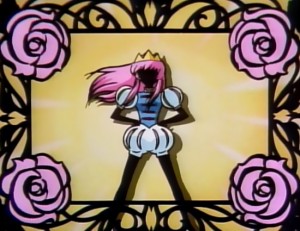 Summary: Ever since being rescued from drowning by a prince when she was a young girl and being encouraged by this mysterious figure to hold on to the nobility she held within her heart, Utena Tenjou has wanted to be a prince. Now considered to be a tomboyish teenager she attends the prestigious Ohtori Academy where she meets Anthy Himemiya, suffering in an abusive relationship. Trying to protect and rescue Anthy, Utena challenges the man to a duel and learns that he is part of a secret organization running under the guise of the Student Council and that Anthy is the “Rose Bride” and is essentially a prize for the victor of these duels as she becomes engaged to that person. Furthermore the victor is also promised to have the “power to revolutionize the world.” After defeating her opponent and saving Anthy, Utena is quickly drug into the organization as she learns that she, as the most recent victor, must defend her role and Anthy against the other members of the council as she tries to learn the secrets behind the mysterious prophecy.
Summary: Ever since being rescued from drowning by a prince when she was a young girl and being encouraged by this mysterious figure to hold on to the nobility she held within her heart, Utena Tenjou has wanted to be a prince. Now considered to be a tomboyish teenager she attends the prestigious Ohtori Academy where she meets Anthy Himemiya, suffering in an abusive relationship. Trying to protect and rescue Anthy, Utena challenges the man to a duel and learns that he is part of a secret organization running under the guise of the Student Council and that Anthy is the “Rose Bride” and is essentially a prize for the victor of these duels as she becomes engaged to that person. Furthermore the victor is also promised to have the “power to revolutionize the world.” After defeating her opponent and saving Anthy, Utena is quickly drug into the organization as she learns that she, as the most recent victor, must defend her role and Anthy against the other members of the council as she tries to learn the secrets behind the mysterious prophecy.
Why It’s Feminist Friendly: This review is a bit more difficult as Revolutionary Girl Utena is a deeply theoretical, symbolic, psychological, and transcendent anime and I would like to approach it with as little spoilers as possible so bear with me if this description is a little vague. That in mind, the series is striking for its active defiance of gender norms and general disruption of expectations. Utena is, after all, more comfortable in pursuing a role that is traditionally male, even going so far as to prefer wearing her school’s male uniform. It also explores and criticizes misogyny and deconstructs much of what characterizes fairytale stories. The male characters frequently try to win Utena’s affection, as well as other female students, but Utena and the series as a whole scorns the behavior and it also explores the negative effects this emotional and sexual manipulation has on the female students. In fact the male characters are the most often sexualized characters in the series. While some elements of the fairytale remain the same, Anthy is presented on the surface a damsel in distress after all, even those aspects are presented in a critical tone and the legitimacy of them is called into question. Perhaps what is also most notable in this series is its distinctive and frequent presentation on non-heteronormative romance. Though almost every relationship is realistically complicated, there is a strong subtext between Utena and Anthy as being in a relationship – they sleep together and hold hands, even if there’s not an exact confirmation regarding it (until the movie anyway, in which it’s very blatant). There are, however, more instances of this: at least one other female character is clearly romantically interested in Utena and nearly every character at one point explores their sexuality. Furthermore, Anthy, her brother, and the prince that originally rescued Utena are all dark-skinned people of color, though I cannot really address the positives and issues related to this without spoilers so I will refrain. Also bear in mind this show is very psychological and it’s only fair to warn that it does address things like incest, rape, and emotional and physical abuse, so it may be triggering. However over all it is an artistic and insightful anime that questions and subverts gender norms, addresses misogyny, and explores different types of sexuality on a large-scale basis.
http://www.youtube.com/watch?v=gdWr5YCoRGM
Michiko and Hatchin
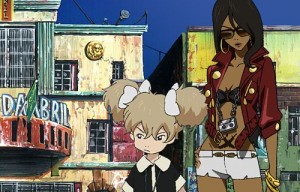 Description: Hana Morenos is a young girl living in an abusive foster home who have adopted her for government benefits. She has literally no one to turn to and no one to really care for her until one day notorious criminal Michiko Malandro escapes from prison and literally comes crashing into her life. Together the two go on an adventure to find the man who is Michiko’s old lover and Hana’s biological father, but along the way they discover the value of each other’s company and find their own freedom.
Description: Hana Morenos is a young girl living in an abusive foster home who have adopted her for government benefits. She has literally no one to turn to and no one to really care for her until one day notorious criminal Michiko Malandro escapes from prison and literally comes crashing into her life. Together the two go on an adventure to find the man who is Michiko’s old lover and Hana’s biological father, but along the way they discover the value of each other’s company and find their own freedom.
Why It’s Feminist Friendly: Set in a fictional country that much resembles Brazil or another similar Latin/South American country, Michiko and Hatchin is an cultural mash of Japanese and Latino influence. That being said there are a variety of races and skin colors presented in the anime, with most significant characters having different physical makeups, and thus it displays a variety of racial representations. Although not to an extensive degree the series also presents people of different body shapes and types, each being notably realistic for an animated show, and to a large extent does not present this fact negatively. Michiko really harnesses her sexuality and largely acts of her own agency, but there are some questionable camera angles and problematic moments of over-sexualization, especially considering the racial stereotypes of Latina women. However what really drives this series is the relationship between Michiko and Hatchin and the development it has over the course of the series. Each have very distinct, complex, and generally clashing personalities and throughout the series they struggle to work together and understand each other. But as it progresses you do see glimpses into how they truly care about each other. They, and the other female characters, are all strong in their own ways and they confront and challenge the male figures both with their own power and united. Their relationships are complex but genuine and Hana and Michiko in particular always defend each other. For this as well as the complexity in which people of color are portrayed, especially women of color, the series is definitely one of value. However, like Revolutionary Girl Utena, it addresses themes of abuse as well as other potentially triggering topics and is generally a rather mature show designated for an older audience. This is a representative of the josei type of anime, which literally means “ladies’ comics,” a genre that is markedly created for female audiences and that focus on more mature, women-centered themes like sexuality and relationships. This is often a notably feminist genre particularly as it is often created by women for women.
Puella Magi Madoka Magica
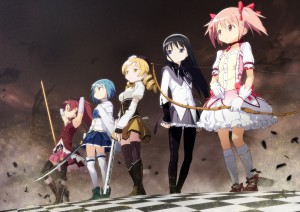 Description: Fourteen-year-old Madoka Kaname is a normal school girl until the day she comes across a magical girl fighting witches, evil creatures that seek to devour humanity, as well as a magical creature called Kyuubey. He informs her and her best friend that they can make any wish they desire in exchange for working as a magical girl and ridding the world of the witches. Initially tempted by the idea of making something of herself and fighting against evil, Madoka’s decision becomes a complicated one when she encounters more magical girls and learns things are not as straightforward as they seem to appear.
Description: Fourteen-year-old Madoka Kaname is a normal school girl until the day she comes across a magical girl fighting witches, evil creatures that seek to devour humanity, as well as a magical creature called Kyuubey. He informs her and her best friend that they can make any wish they desire in exchange for working as a magical girl and ridding the world of the witches. Initially tempted by the idea of making something of herself and fighting against evil, Madoka’s decision becomes a complicated one when she encounters more magical girls and learns things are not as straightforward as they seem to appear.
Why It’s Feminist Friendly: The magical girl genre of anime is particularly notable for being extremely feminist-friendly, with young girls finding strength within their femininity and within each other, defeating enemies with cooperation and teamwork in a way that empowers their sense of love and turning the traditional aspects associated with femininity into physical modes of power. Noted for its dark twist on the magical girl formula, Puella Magi Madoka Magica presents this in a less blatant and more complicated way. Each girl has a complex character driven by their own motivations and the diversity presented in the typical magical girl series is even more so present here, as they do not become tropes or archetypes. However, rather than finding strength in solidarity, they instead are almost all hesitant to work together. But while the show’s darker undertones do seem to taint and destroy the innocence and strength magical girls generally have, particularly in those series made for children, it is eventually subverted and shown to not be insurmountable, as womanhood eventually breaks free from inevitable corruption and the system is essentially “fixed.” The girls eventually learn to find strength and support in one another and take their fate in their own hands. It is this aspect that really redeems the series and marks it as a more mature take on the magical girl genre that so defines women solidarity.
On a final note: I have included the English dubbed videos here whenever possible, but I highly recommend watching them in Japanese with subtitles if possible to get the full effect/intentions of the series.
Do you have any other recommendations? Or even just favorite animes? Let me know in the comments!

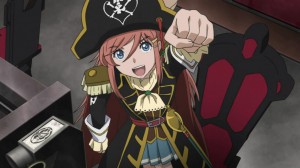



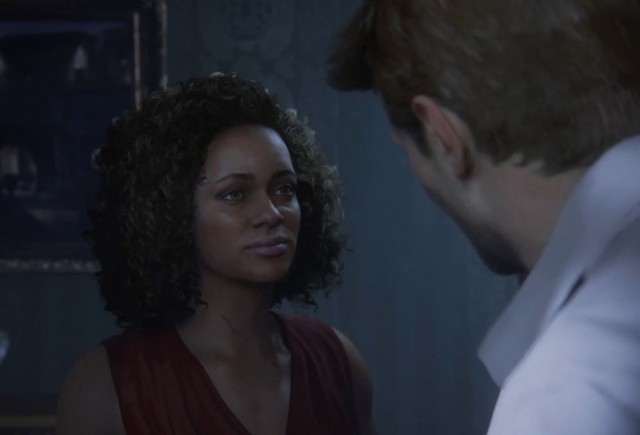
3 thoughts on “Beyond the Panty Shot: Feminist Representations in Anime”
I always have lots of problems finding anime I like due to the over saturation of “fan service”. I will definitely be checking these animes out. 🙂 Some of my favorites are Full Metal Alchemist, Trigun and Mushi-shi(my favorite) and some of the different Gundams. I just finished watching Fairy Tale, which was good but had quite a bit too much “fan service” that just pissed me off.
My list:
Steins;Gate -> The stereotypical sex-obsessed geek boy can get annoying, but the female lead is excellent, and the core romantic relationship is far from hetero-normative. Hilarious at times, as well.
Mushishi -> Not many female characters but a brilliant, beautiful, heart-wrenching anime that doesn’t have any problematic elements that I can think of (nice to have sometimes 🙂 ).
Slayers -> Strong female lead, who usually ends up saving everyone. Lina kicks ass and should be on more T-shirts IMHO. 🙂
Cowboy Bebop -> Despite Faye wearing very little, she is a strong, independent, kick-ass primary character. This series has some of the most beautiful moments, and one of the two-part episodes has a wonderful reveal of a marginalised person you rarely ever see (I won’t spoil it for you).
Wolf’s Rain -> Prepare to cry. And then cry. And then cry some more. The lead characters are 4 boys, but it has some excellent female characters.
Bleach -> Definitely has some problems, but also has some strong female characters.
Tri-Gun -> The movie is very problematic, but the TV series was wonderful. The 2 major female characters are excellently written.
That is all I can think of off the top of my head.